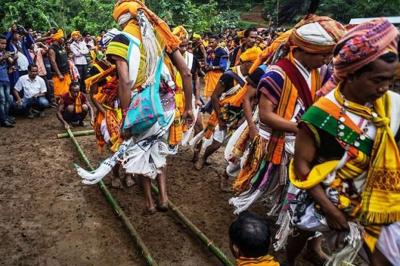History & Traditions
Wanchuwa Festival – A Vibrant Harvest Celebration of the Tiwa Tribe in Assam
Origin and Meaning of Wanchuwa Festival
The word “Wanchuwa” in the Tiwa language translates to “post-harvest celebration.” For the Tiwa people, who depend largely on agriculture and jhum (shifting cultivation), this festival marks the successful end of the harvest season and the beginning of rest and rejuvenation. The rituals symbolize harmony with nature, unity among communities, and respect for ancestral spirits.
Rituals and Ceremonies at Wanchuwa Festival
The Wanchuwa Festival is a perfect blend of spirituality, community bonding, and joyful expression. The celebrations begin with prayers offered to deities such as Sodonga Raja and Maldewa Raja, seeking blessings for continued fertility of the land. One of the most significant rituals involves pounding freshly harvested rice in large wooden mortars to prepare a special paste. This paste is sprinkled among villagers as a symbol of blessing and shared prosperity.
Another highlight is the preparation of Wanrusa, a steamed rice cake made from the pounded rice paste. It is distributed among all villagers and offered to the deities as a token of gratitude. These rituals emphasize unity and equality, as every member of the community—young or old—participates in the process.
Music, Dance, and Cultural Expressions at Wanchuwa Festival
The festival comes alive with rhythmic beats and traditional Tiwa songs. The famous Mu-Khel (dance performance) forms the centerpiece of the celebration, performed by Tiwa youth in colorful traditional attire. The dancers move to the rhythm of indigenous instruments like the Khram (drum) and Pangsi (flute), symbolizing joy, fertility, and communal harmony. The performances often depict agricultural life, hunting scenes, and tales of Tiwa mythology.
Feasting and Social Bonding at Wanchuwa Festival
No Assamese festival is complete without a feast, and Wanchuwa is no exception. Villagers prepare traditional dishes made from locally sourced ingredients, including rice beer, meat, vegetables, and rice cakes. The communal feasting represents the Tiwa philosophy of sharing resources and celebrating abundance together. Folk games, songs, and storytelling sessions further strengthen community ties.
Time and Frequency of Wanchuwa Festival
The Wanchuwa Festival is generally observed between June and August, coinciding with the post-harvest period of the Tiwa agricultural cycle. Interestingly, in some villages, it is celebrated every five or six years, depending on local customs and agricultural patterns.
Cultural Importance and Tourism Potential at Wanchuwa Festival
The Wanchuwa Festival plays an important role in preserving the cultural identity of the Tiwa tribe. It not only reflects their agricultural roots and spiritual connection with nature but also promotes eco-tourism and ethnic tourism in Assam. Visitors from across India and abroad come to witness the authenticity, colors, and joy of this tribal festivity.
As Assam promotes its tribal and cultural festivals on the global stage, the Wanchuwa Festival stands as a shining example of sustainable cultural tourism—a festival that celebrates life while respecting nature’s balance.
Conclusion
The Wanchuwa Festival is more than just a harvest celebration—it’s a living tradition that showcases the Tiwa community’s gratitude, unity, and reverence toward nature. For travelers seeking an authentic cultural experience in Northeast India, witnessing this festival is a journey into the heart of Assam’s indigenous heritage and rural harmony.
Wanchuwa Festiva Quick Info Table
| Category | Details |
|---|---|
| Festival Name | Wanchuwa Festival |
| Celebrated By | Tiwa (Lalung) Tribe of Assam |
| Location | Karbi Anglong, Morigaon, and Nagaon districts |
| Festival Type | Post-harvest tribal festival |
| Key Rituals | Rice pounding, Wanrusa preparation, ancestral prayers |
| Main Highlights | Traditional dances, folk music, communal feasting |
| Time of Celebration | June to August (varies by village) |
| Major Deities Worshiped | Sodonga Raja and Maldewa Raja |
| Cultural Importance | Symbol of gratitude, unity, and prosperity |
| Nearest Tourist Spots | Kaziranga National Park, Nagaon Town, Diphu |
Wanchuwa Festival FAQs
-
What is the Wanchuwa Festival?
The Wanchuwa Festival is a post-harvest celebration of the Tiwa tribe in Assam, expressing gratitude for a successful agricultural season. -
Where is the Wanchuwa Festival celebrated?
It is mainly celebrated in the Tiwa-inhabited regions of Karbi Anglong, Morigaon, and Nagaon districts of Assam. -
When is the Wanchuwa Festival held?
The festival usually takes place between June and August, after the harvest season. -
Who celebrates the Wanchuwa Festival?
The festival is celebrated by the Tiwa (Lalung) tribe, one of the prominent indigenous communities of Assam. -
What is the meaning of Wanchuwa?
“Wanchuwa” means “post-harvest celebration” in the Tiwa language. -
What are the main attractions of the Wanchuwa Festival?
Traditional Tiwa dances, rice-pounding rituals, songs, feasts, and offerings to deities are the major highlights. -
What is Wanrusa in the Wanchuwa Festival?
Wanrusa is a steamed rice cake prepared from pounded rice paste, distributed and offered during the festival. -
Why is the Wanchuwa Festival important?
It preserves Tiwa cultural heritage, promotes unity, and strengthens Assam’s eco-cultural tourism. -
Can tourists attend the Wanchuwa Festival?
Yes, visitors are welcome to witness the cultural performances, rituals, and feasts during the celebration. -
How does the Wanchuwa Festival promote eco-tourism?
It encourages sustainable tourism by highlighting organic agriculture, tribal traditions, and eco-friendly practices.
